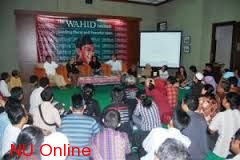Wahid Institute to promote peaceful Islam on social media
Senin, 2 November 2015 | 23:50 WIB
Jakarta, NU Online
The Wahid Institute has announced plans to utilize social media to promote peaceful Islamic values.
<>
“We believe that the message of Islam is a peaceful one and we aim to unite everyone with the same vision,” said Wahid Institute community economic development program officer, Gamal Ferdhi.
Supporters of the plans include the Indonesian Society for Pesantren and Community Development, Nahdlatul Ulama (NU) Online and the Indigenous People’s Alliance of the Archipelago (AMAN) as well as progressive Muslim activists.
According to internet marketing expert Nukman Luthfie, it is indeed important to understand consumer behavior and taking advantage of popular social media platforms to create conversation.
Three elements that had to be observed in creating popular and accessible content, said Nukman, were the format, the contextual environment and mainstream media usage.
Gamal admitted that the Wahid Institute faced challenges in communicating its vision due to its mainly text-based online content.
“We are now aiming to have more visual content [on our website], specifically videos and images, to communicate tolerance, pluralism and respect for diversity,” said Gamal as quoted by The Jakarta Post.
The Institute for Policy Analysis of Conflict (IPAC) recently reported that growing use of social media among Indonesian supporters of the Islamic State (IS) movement has helped the group reach a wider audience.
The report looks at the way in which Indonesian extremists use Facebook, Twitter and various smartphone applications like WhatsApp and Telegram.
"The propaganda seems to be having an impact, particularly the depictions of daily life in the Islamic State and the camaraderie of Indonesian fighters, smiling broadly with their new weapons or enjoying a dip in a hotel swimming pool after battle," said IPAC director Sidney Jones.
The government has reported that more than 500 Indonesians were believed to have joined the IS movement since the conflict began and about half of those had gone on to fight in Syria or Iraq. (masdar)




